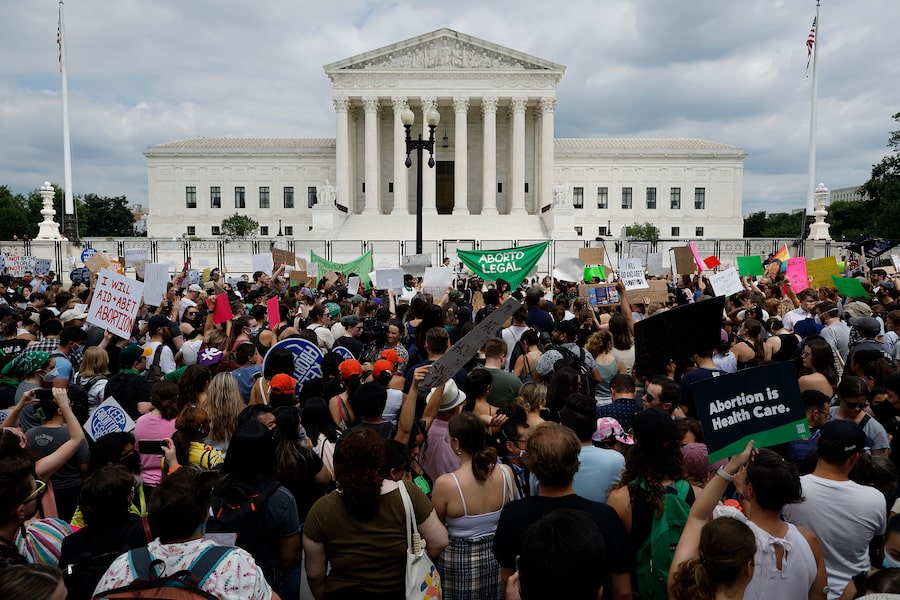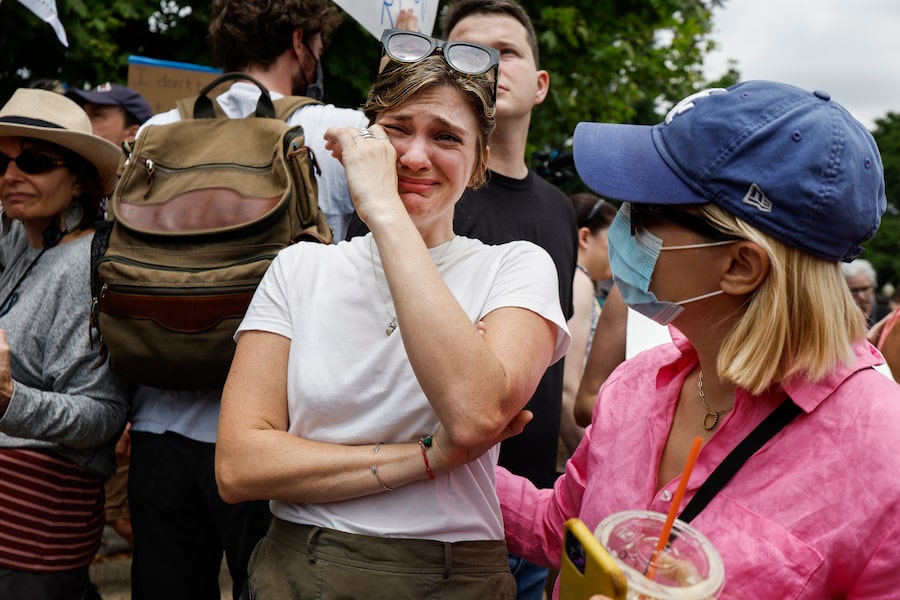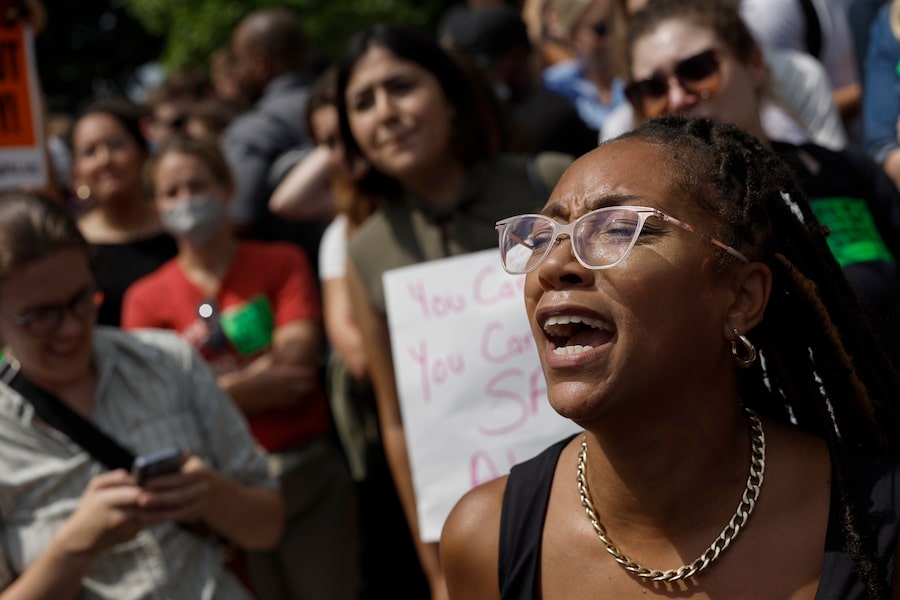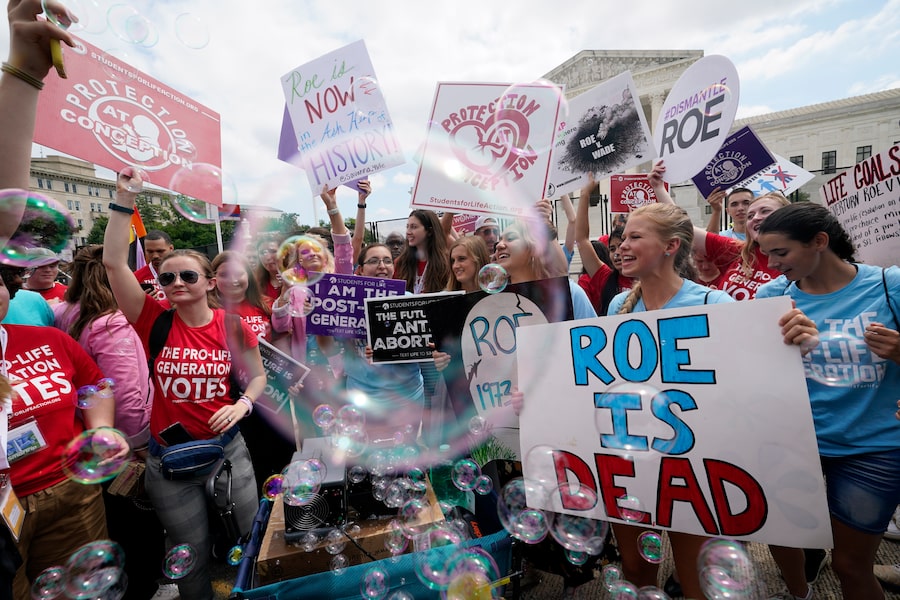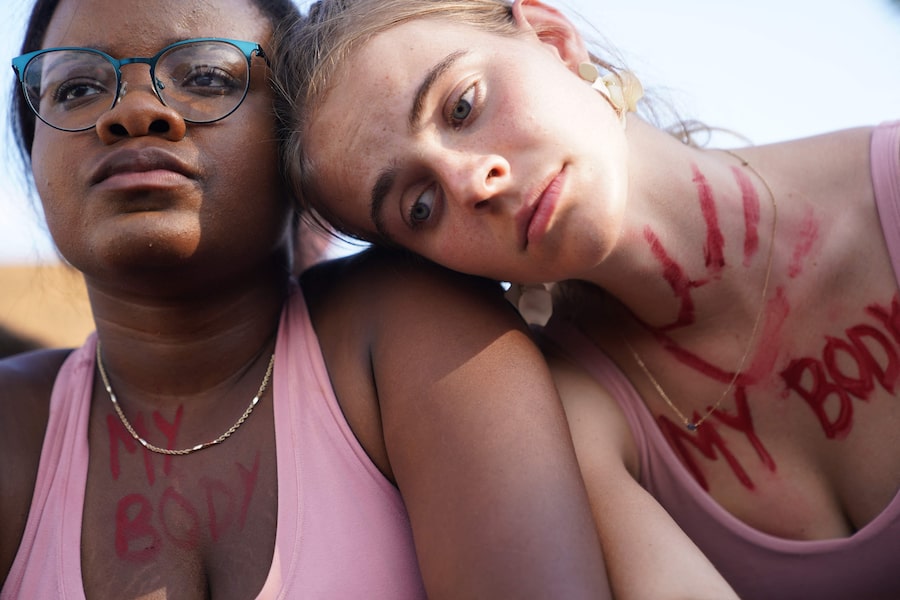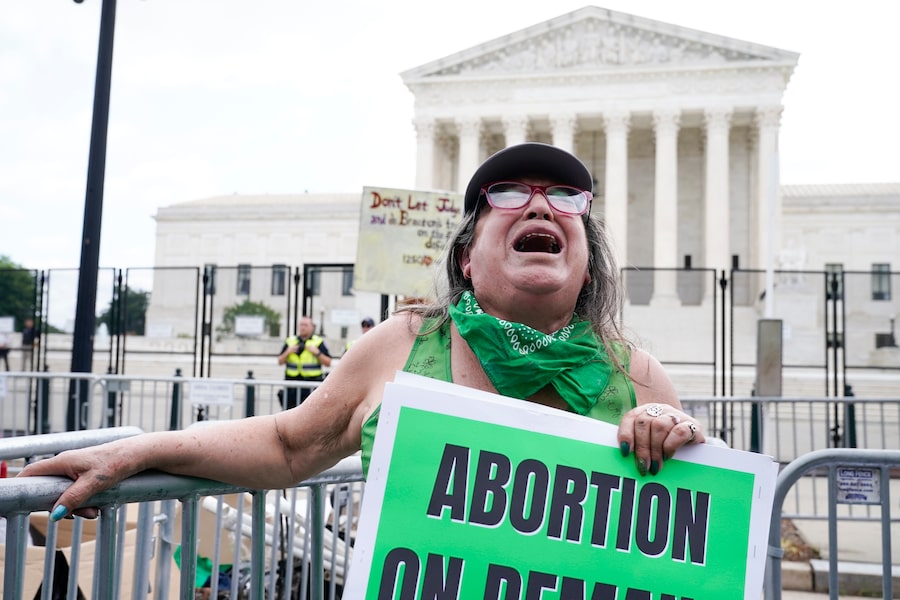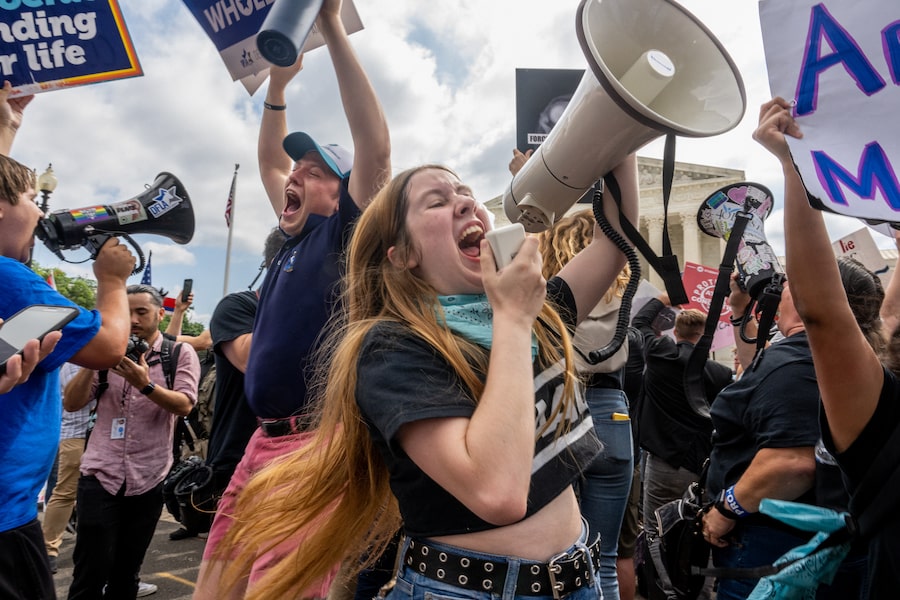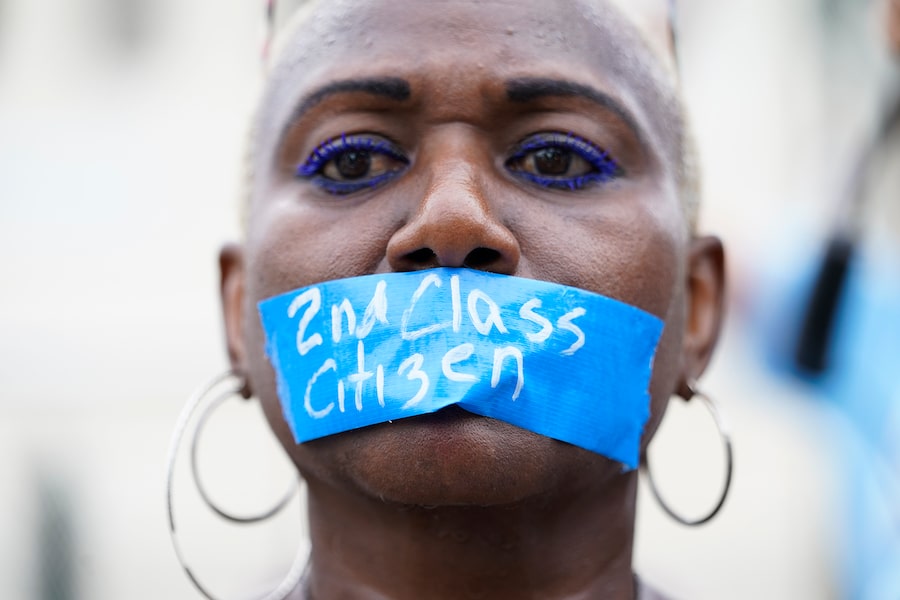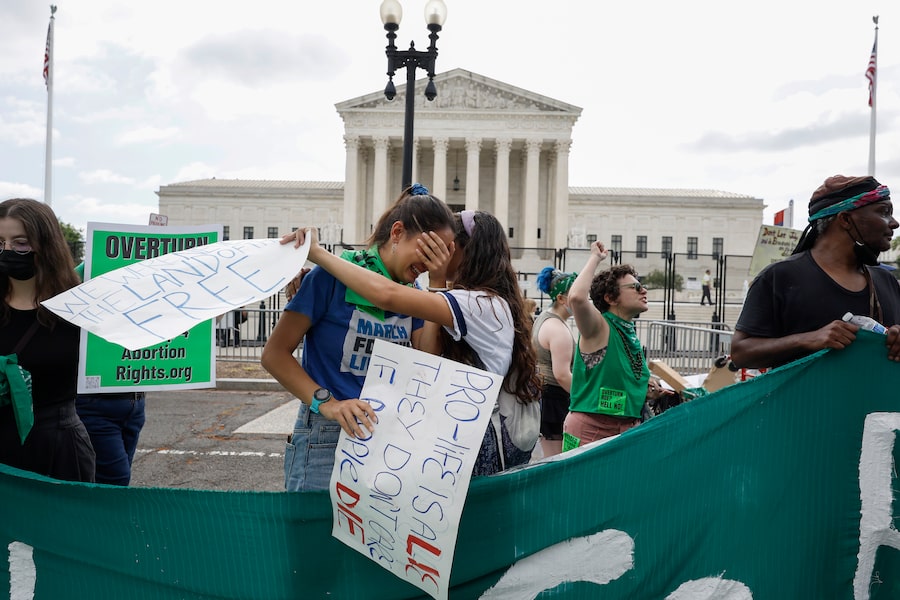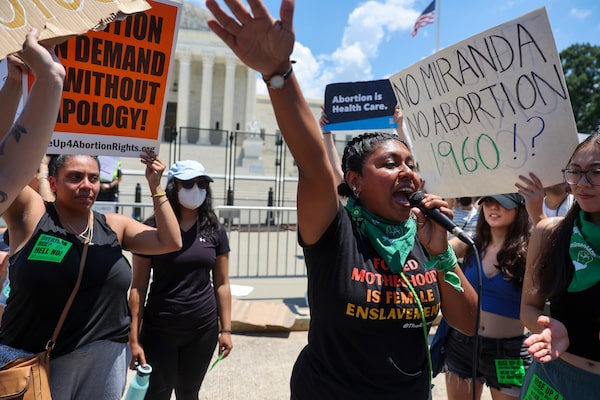
Protesters gather in the wake of the decision overturning Roe v. Wade outside the U.S. Supreme Court on June 25, 2022 in Washington, D.C.Tasos Katopodis/Getty Images
Hundreds of protesters descended on the U.S. Supreme Court on Saturday to denounce the justice’s decision to overturn the half-century-old Roe v. Wade precedent that recognized women’s constitutional right to abortion.
The sweeping ruling by the court, with a 6-3 conservative majority, was set to vastly change American life, with nearly half the states considered certain or likely to ban abortion. Conservative Justice Clarence Thomas suggested the court’s reasoning could also lead it to reconsider past rulings protecting the right to contraception, legalizing gay marriage nationwide, and invalidating state laws banning gay sex.
As the day progressed, the number of demonstrators outside the Supreme Court increased substantially. The fenced-off area in front of the high court was filled largely with those demanding abortion rights.
Crowds carried posters with slogans such as “Abort SCOTUS.” One protester carried a placard that said “limit guns, not women” in reference to another Supreme Court decision this week expanding gun rights.
Earlier in the afternoon, a supporter of Friday’s ruling said: “The thing that ‘my body, my choice’ advocates don’t get is that the aborted baby never had a choice.”
The man, who identified himself as Adam John, added, “The life in the womb matters, doesn’t it.”
President Joe Biden, who on Friday expressed his deep disappointment with the court ruling, said on Saturday that the White House will monitor how states enforce bans, with administration officials having already signaled they plan to fight attempts to prohibit a pill used for medication abortion.
With Roe v. Wade reversal, U.S. Supreme Court gives states free rein over abortion rights
Roe v. Wade’s fall sets a ‘frightening precedent,’ retired Canadian Supreme Court justice says
“The decision is implemented by states,” Biden said. “My administration is going to focus on how they administer and whether or not they violate other laws.”
The White House said it also would challenge any efforts by states to restrict women’s ability to travel out of their home state to seek an abortion.
At a rally in western Illinois on Saturday, former president Donald Trump praised the Supreme Court ruling, calling it “a victory for the Constitution, a victory for the rule of law and above all a victory for life.” He reminded his audience that in 2016 he made a campaign promise to nominate judges “who would stand up for the original meaning of the Constitution.”
Meanwhile, a Vatican official, Andrea Tornielli, wrote in an editorial that anti-abortion activists should be concerned with other threats to life too, such as easy access to guns, poverty and rising maternity mortality rates.
For Christian conservatives who had long fought to overturn Roe, Friday’s ruling was a cherished win and in part the result of a long campaign for installing anti-abortion justices to the top court. The ruling had the support of all three justices appointed by Trump.
It is at odds with broad public opinion. A Reuters/Ipsos poll last month found that about 71 per cent of Americans - including majorities of Democrats and Republicans - said decisions about terminating a pregnancy should be left to a woman and her doctor, rather than regulated by the government. That support is not absolute: 26% of respondents polled said abortion should be legal in all cases while 10% said it should be illegal in all cases, with the majority supporting some limits.
The ruling will likely influence voter behavior in the Nov. 8 midterm elections, when Biden’s Democrats face a high risk of losing their razor-thin majorities in the House of Representatives and possibly the Senate. Some party leaders hope the decision will win over suburban swing voters, though activists expressed disappointment and demoralization at suffering such a defeat while their party held total power in Washington.
“They can ask for vote for more power but don’t they already have the Congress and the White House?” said Patricia Smith, a 24-year-old supporter of abortion rights, who was headed to the Supreme Court to protest. “They have not been able to pass much in terms of legislation despite the power, so what is the point?”
The decision came just a day after the court issued another landmark ruling finding that Americans have a constitutional right to carry a concealed gun for protection — leading them to invalidate a New York state law that set strict limits on concealed carry permits.
The two rulings showed an aggressively conservative court ready to flex its muscle and remake American life at a time when Congress is often deadlocked and struggles to pass major policy changes.
It also signaled that Chief Justice John Roberts, a conservative who preferred to act incrementally, no longer holds the power to slow the court’s action. Roberts had voted to support the Mississippi abortion ban that was the subject of Friday’s decision, but did not vote to overturn Roe itself.
During a call with journalists on Saturday, a group of Democratic state attorneys general said they would not use their offices to enforce abortion bans.
“We are not going to use the resources of the Wisconsin Department of Justice to investigate or prosecute anybody for alleged violations of the 19th century abortion ban,” said Josh Kaul, that state’s attorney general. “I’ve also encouraged district attorneys, sheriff prosecutors and police chiefs in our state not to use their resources to investigate or prosecute abortions.”
The White House on Saturday said it would challenge any efforts by states to restrict women’s ability to travel out of their home state to seek an abortion.
TEARS, ANGER AT THE ‘PINK HOUSE’
The case that led to Friday’s decision revolved around a Mississippi law that bans most abortions after 15 weeks of pregnancy, before the fetus is a viable outside the womb. The Jackson Women’s Health Organization, nicknamed the “Pink House” because of its bubble gum-colored paint, was named in the case.
The clinic was still operating on Saturday morning, with escorts showing up to the state’s sole abortion clinic around 5 a.m. to prepare for the arrival of patients.
Anti-abortion protesters began setting up ladders to peer over the property’s fence and large posters with messages including “abortion is murder” not long after.
Coleman Boyd, 50, a longtime protester outside the clinic who frequently comes with his wife and children to shout gospel through a bullhorn, incorrectly told women waiting for appointments that they were violating the law.
In truth, Mississippi’s law will not shut down the clinic for another nine days. Boyd called the Roe ruling “history” but “definitely not a victory,” noting that he wanted to see an end to abortion in all states.
